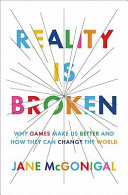A good game keeps you at the edge of your ability
As you successfully lock in Tetris puzzle pieces, you get three kinds of feedback: visual—you can see row after row of pieces disappearing with a satisfying poof; quantitative—a prominently displayed score constantly ticks upward; and qualitative—you experience a steady increase in how challenging the game feels.
This variety and intensity of feedback is the most important difference between digital and nondigital games. In computer and video games, the interactive loop is satisfyingly tight. There seems to be no gap between your actions and the game’s responses. You can literally see in the animations and count on the scoreboard your impact on the game world. You can also feel how extraordinarily attentive the game system is to your performance. It only gets harder when you’re playing well, creating a perfect balance between hard challenge and achievability
In other words, in a good computer or video game you’re always playing on the very edge of your skill level, always on the brink of falling off. When you do fall off, you feel the urge to climb back on. That’s because there is virtually nothing as engaging as this state of working at the very limits of your ability—or what both game designers and psychologists call “flow.”4 When you are in a state of flow, you want to stay there: both quitting and winning are equally unsatisfying outcomes.
Notes:
Folksonomies: gamification
Taxonomies:
/hobbies and interests/games/video and computer games (0.574588)
/art and entertainment/music (0.501506)
/technology and computing/software/graphics software/animation (0.500801)
Keywords:
Tetris puzzle pieces (0.934329 (positive:0.718172)), game (0.737341 (positive:0.260880)), steady increase (0.577438 (positive:0.809546)), game feels (0.536298 (negative:-0.360935)), important difference (0.527353 (positive:0.870494)), nondigital games (0.518044 (neutral:0.000000)), good game (0.515519 (positive:0.718172)), perfect balance (0.514716 (positive:0.433022)), video games (0.486685 (neutral:0.000000)), skill level (0.481909 (positive:0.517938)), game world (0.477718 (neutral:0.000000)), game designers (0.462040 (neutral:0.000000)), video game (0.447354 (positive:0.234318)), row (0.304813 (positive:0.346497)), feedback (0.294277 (positive:0.870494)), edge (0.257129 (positive:0.618055)), poof (0.240992 (neutral:0.000000)), state (0.232183 (negative:-0.691393)), urge (0.205632 (negative:-0.568456))
Concepts:
Video game (0.957523): dbpedia | freebase | opencyc
English-language films (0.825200): dbpedia
Game (0.794891): dbpedia | freebase | opencyc
Video game console (0.628573): dbpedia | freebase | opencyc
Video game industry (0.619635): dbpedia | freebase | yago
Game designer (0.581693): dbpedia | opencyc | yago
Debut albums (0.547311): dbpedia
2001 albums (0.528834): dbpedia





